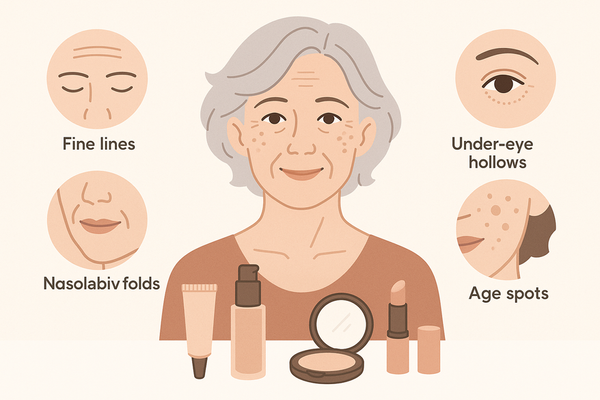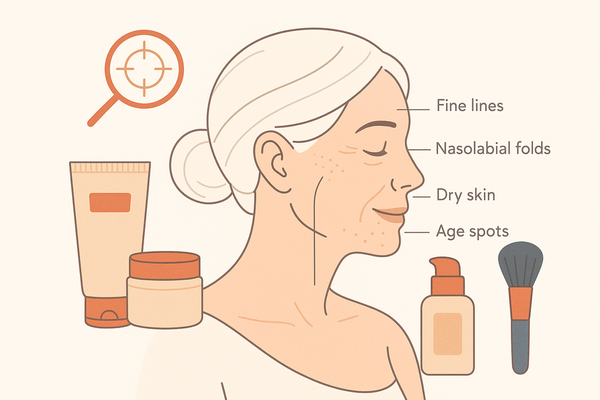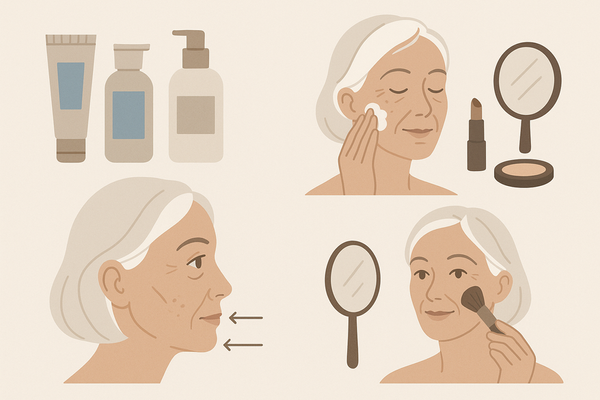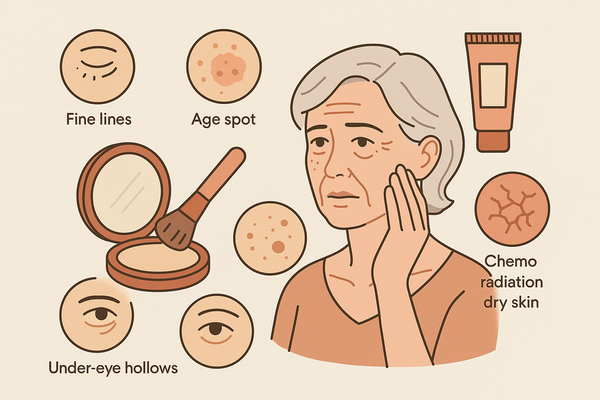Makeup and Diet Skincare Tips: A Holistic Guide to Radiant Skin
Explore makeup and diet skincare tips to enhance your skin's radiance. Learn to integrate beauty routines with nutrition for lasting, holistic benefits.
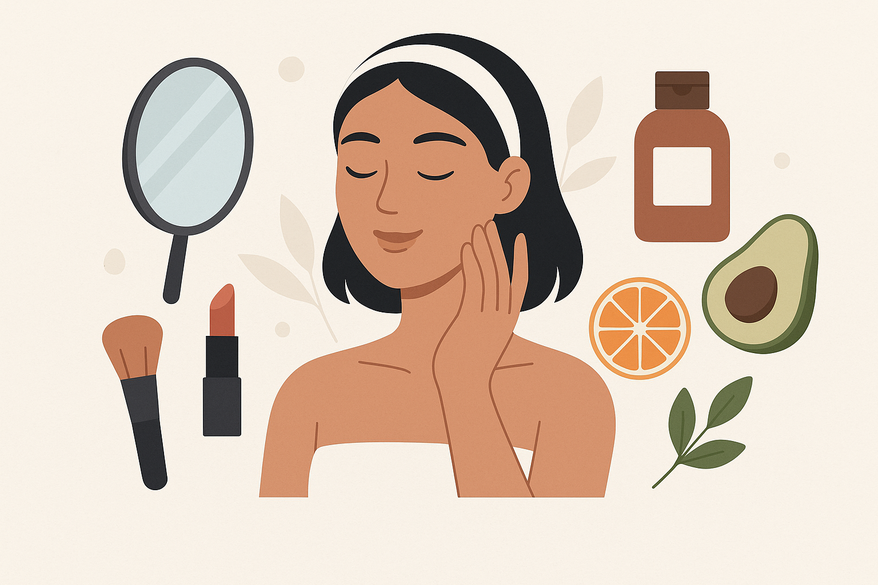
Estimated reading time: 8 minutes
Key Takeaways
- Holistic approach combines external makeup routines with internal nutrition for lasting radiance.
- Skin-friendly cosmetics (non-comedogenic, hypoallergenic, enriched pigments) protect the barrier.
- Nutrient-rich diet (vitamins C, E, A, omega-3, antioxidants) fuels cellular repair and hydration.
- Integrated strategies like double cleansing, makeup-free days, and tool hygiene amplify results.
- Consistency in both topical and dietary care ensures healthier, resilient skin over time.
Table of Contents
- Section 1: How Makeup Choices Affect Skin Health
- Section 2: Key Nutrients and Foods for Glowing Skin
- Section 3: Combining Cosmetic Habits with Nutritious Eating
- Section 4: What Dermatologists and Nutritionists Say
- Section 5: Your Daily Holistic Skincare Checklist
- Conclusion
- FAQ
Section 1: How Makeup Choices Affect Skin Health
Makeup can be a powerful ally for confidence and self-expression, yet the wrong products or routines may weaken your skin barrier. Here’s how to optimize your cosmetic habits.
Role of Makeup in Skin Wellness
- Boosts confidence and evens tone.
- Can support barrier function when formulated with skin-benefiting ingredients.
- Risks include clogged pores, irritation, and premature aging if products are comedogenic or harsh.
Skincare-Friendly Makeup Products
- Non-comedogenic: won’t block pores.
- Hypoallergenic: reduces risk of irritation.
- Enriched with:
- Silica for oil control and soft-focus finish.
- Glycerin to attract moisture.
- Mineral pigments (iron oxides, titanium dioxide) for UV protection and low reactivity.
Harmful Makeup Routines
- Sleeping with makeup: traps debris and oil overnight.
- Using products with alcohol, sulfates, or heavy fragrances: strips lipids and irritates skin.
- Layering incompatible actives (e.g., retinol + benzoyl peroxide under foundation): increases sensitivity.
Supportive Makeup Routines
- Double cleanse: oil-based cleanser followed by gentle, pH-balanced wash.
- Skin-first layering: serum → moisturizer → primer → foundation.
- Occasional “skin-fast” days: skip makeup to let barrier recover.
Real-World Tip: Dermatologists recommend swapping heavy powder foundations for tinted moisturizers containing SPF and hydrating agents. This reduces pore congestion while delivering light coverage.
Source: Skincare Commitment Is Important
Section 2: Key Nutrients and Foods for Glowing Skin
Your diet directly fuels cellular repair and barrier function. Focusing on nutrient-dense foods ensures your skin stays supple, resilient, and radiant.
Nutrition’s Role in Skin Health
- Antioxidants neutralize free radicals from UV and pollution.
- Essential fatty acids reinforce lipid barrier and elasticity.
- Vitamins and minerals regulate sebum production and cell turnover.
- Proper hydration maintains plumpness and flushes toxins.
Source: Nutrition and Skin Health
Crucial Skin-Supporting Nutrients
- Vitamin C – aids collagen synthesis, protects against photoaging.
- Vitamin E – maintains membrane integrity and moisture retention.
- Omega-3 Fatty Acids – ensure elasticity and hydration; sources: fatty fish, walnuts, flaxseeds.
- Polyphenols & Carotenoids – reduce inflammation, boost UV resistance; found in berries, green tea, carrots.
- Zinc & Vitamin A – regulate oil production, promote healthy cell turnover.
- Water – hydration for metabolic waste removal; supports every biochemical skin process.
Skin-Boosting Foods to Include Daily
- Tomato paste UV protection: concentrates lycopene to defend against sun damage.
- Avocados: rich in monounsaturated fats and vitamin E for supple skin.
- Dark chocolate (70%+ cacao): high in flavonoids for improved circulation.
- Berries: loaded with anthocyanins to fight oxidative stress.
- Leafy greens: abundant in vitamins A, C, and K.
- Nuts & seeds: provide zinc, selenium, and healthy fats.
- Green tea: catechins that soothe inflammation.
Sources: PMC Article, WebMD Healthy Skin Diet
Section 3: Combining Cosmetic Habits with Nutritious Eating
Integrating your makeup regimen with a skin-focused diet multiplies benefits. Here’s a roadmap to unify both worlds.
Tip 1: Tool Hygiene + Hydration
- Clean makeup brushes, sponges, and applicators weekly—prevents bacterial buildup and breakouts.
- Drink 8+ glasses of water daily to maintain barrier function and reduce oiliness.
Tip 2: Combat Dryness from Cosmetics
- If foundation makes your skin flaky, ramp up omega-3 intake (fish, chia seeds).
- Use topical hyaluronic acid serums to bind moisture in the stratum corneum.
Tip 3: Balance Inflammation and Oil
- Munch on zinc-rich snacks (pumpkin seeds) to regulate sebum and heal blemishes.
- Eat vitamin A foods (carrots, sweet potatoes) to support epidermal turnover and soothing.
Tip 4: Skin-Fast Days + Antioxidant Meals
- Schedule 1–2 weekly makeup-free days.
- Pack meals with colorful fruits and veggies (bell peppers, blueberries) to flood skin with polyphenols.
- Let your skin barrier rest while nourishing it from within.
Additionally, exploring hybrid makeup techniques that combine skincare benefits into cosmetics can further elevate your barrier support. Meanwhile, makeup infused with active skincare ingredients bridges the gap between beauty and wellness. And don’t overlook how a nutrient-rich diet can directly enhance your makeup’s longevity and finish.
Pro Tip
Combine anti-blue-light makeup with lutein-rich greens for extra screen-time protection.
Source: PMC Article
Section 4: What Dermatologists and Nutritionists Say
Dermatologist Insight: “An integrated approach yields the best outcomes,” explains Dr. Lisa Martin at SkinCenterBoston. She emphasizes pairing gentle, barrier-supporting skincare with nutrient-rich eating to optimize skin repair and resilience.
Nutritionist Recommendation:
- Personalize your diet to your skin type:
- Acne-prone: low-glycemic index foods (legumes, whole grains).
- Sensitive: anti-inflammatory diet rich in omega-3s and antioxidants.
- Monitor food triggers with a skin-food diary.
Evidence-Based Findings:
- Diets high in fruits, vegetables, lean proteins, and water boost hydration and elasticity within 4–6 weeks.
- Studies show up to 30% improvement in fine lines when participants increased daily vitamin C and E intake.
Sources: WebMD Healthy Skin Diet, PMC Article
Section 5: Your Daily Holistic Skincare Checklist
AM Routine
- Cleanse with a gentle, pH-balanced gel or foam.
- Apply antioxidant serum (vitamin C) to fight daily free radicals.
- Layer moisturizer with squalane to lock in hydration.
- Finish with broad-spectrum mineral sunscreen (SPF 30+).
- Use light, non-comedogenic tinted moisturizer or foundation.
PM Routine
- Double cleanse:
- Oil-based cleanser to dissolve makeup.
- Water-based cleanser to remove residue.
- Apply retinol or vitamin A product (2–3 times weekly if tolerated).
- Seal with a hydrating moisturizer rich in hyaluronic acid or ceramides.
Lifestyle Habits
- Hydrate: aim for 2+ liters of water daily to support metabolic detox and skin plumpness. Source: PMC Article
- Sleep: 7–9 hours nightly to allow collagen synthesis and repair.
- Stress Management: practice meditation, yoga, or breathing exercises to lower cortisol and prevent breakouts.
- Diet: include daily servings of colorful fruits/vegetables, oily fish, nuts, and seeds.
Ingredients to Look For
- Niacinamide: strengthens barrier and evens tone.
- Hyaluronic Acid: draws moisture into epidermis.
- Squalane: mimics skin’s natural oils.
- Mineral Sunscreens: zinc oxide, titanium dioxide.
- Non-comedogenic Pigments: iron oxides, ultramarines.
Conclusion
Makeup and diet skincare tips work in tandem to yield healthier, more resilient skin. By adopting mindful makeup routines and nourishing your body with essential nutrients, you support barrier function, reduce breakouts, and slow visible aging. Consistency in both external and internal care delivers a sustained glow you can see and feel. Experiment with these integrated strategies, track your skin’s response, and fine-tune your regimen for personalized results. We invite you to share your own makeup and diet skincare tips in the comments or tag us on social media to join the conversation about true, holistic beauty.
For a seamless fusion of digital analysis and personalized care, consider integrating an AI Makeup Generator like Makeup Check AI into your routine to analyze skin health, match products, and monitor progress as you optimize both topical and dietary strategies.
FAQ
- How do I choose skin-friendly makeup?
Look for non-comedogenic, hypoallergenic formulas enriched with skin-supporting ingredients like glycerin and mineral pigments. - Which foods promote glowing skin?
Focus on vitamin C–rich fruits, omega-3 sources (fatty fish, flaxseeds), antioxidants (berries, green tea), and healthy fats (avocado, nuts). - How often should I have makeup-free days?
Aim for 1–2 makeup-free days each week to allow your skin barrier to recover and breathe. - Can diet improve makeup longevity?
Yes—hydrated, well-nourished skin helps cosmetics apply more smoothly and last longer. - What’s the benefit of double cleansing?
It ensures complete removal of makeup, sunscreen, and impurities—first with oil-based cleansers, then with gentle foams or gels.

